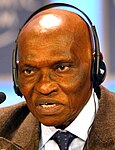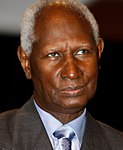
Politics in Senegal takes place within the framework of a presidential democratic republic. The President of Senegal is the head of state and government. Executive power in Senegal is concentrated in the president's hands.

Abdoulaye Wade is a French then Senegalese politician who was President of Senegal from 2000 to 2012. He is also the Secretary-General of the Senegalese Democratic Party (PDS), having led the party since it was founded in 1974. A long-time opposition leader, he ran for President four times, beginning in 1978, before he was elected in 2000. He won re-election in 2007 with a majority in the first round, but in 2012 he was defeated in a controversial bid for a third term.
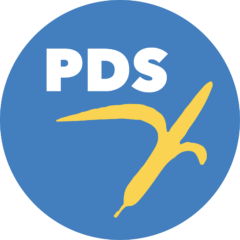
The Senegalese Democratic Party is a political party in Senegal. The party considers itself a liberal party and is a member of the Liberal International. Abdoulaye Wade, who was President of Senegal from 2000 to 2012, is the party's leader. The PDS ruled together with smaller parties as part of the Sopi Coalition. Since Wade's defeat in the 2012 presidential election, the PDS has been the main opposition party.

Abdou Diouf is a Senegalese politician who was the second President of Senegal, in office from January 1981 to April 2000.

The African Party of Independence of Cape Verde is a democratic socialist political party in Cape Verde. It was formerly a Marxist–Leninist communist party and the sole legal party in the country from 1981 to 1990. Its members are nicknamed "os tambarinas" in Portuguese, and they identify themselves with the color yellow.
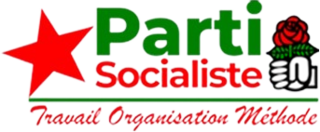
The Socialist Party of Senegal is a political party in Senegal. It was the ruling party in Senegal from independence in 1960 until 2000. In 2000, the party's candidate and previous incumbent president, Abdou Diof, was defeated by the leader of the Senegalese Democratic Party, Abdoulaye Wade.
The And-Jëf/African Party for Democracy and Socialism is a socialist political party in Senegal led by Landing Savané.

The Convention of Democrats and Patriots was a political party in Senegal that was led by Iba Der Thiam.

The Rally for Mali is a Malian political party created by Ibrahim Boubacar Keïta in June 2001. In 2013, Keita was elected President of Mali following several unsuccessful attempts, and the party took first place in parliamentary elections, winning 66 seats, although not enough for a majority.

The Alliance for Democracy in Mali – African Party for Solidarity and Justice is a political party in Mali.
The Social Democratic Party is a political party in Benin.
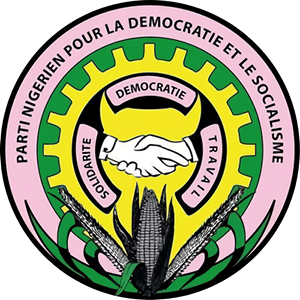
The Nigerien Party for Democracy and Socialism is a political party in Niger. It is a broadly left-leaning party, part of the Socialist International, and in 2011, it has been in power following the election of the former long-time leader, Mahamadou Issoufou. Mohamed Bazoum is the former President of the party and the former Secretary-General is Foumakoye Gado.

The National Assembly is the unicameral legislature of Senegal. The Assembly was previously part of a bicameral legislature from 1999 to 2001 and from 2007 to 2012, with the indirectly elected Senate being the upper house. The Senate was abolished for a second time in September 2012.

Presidential elections were held in Senegal on 25 February 2007. Incumbent president Abdoulaye Wade was re-elected in the first round with almost 56% of the vote.

Parliamentary elections were held in Senegal on 3 June 2007. They had originally been planned to be held together with the presidential election on 25 February 2007, but were postponed. Fourteen parties or coalitions participated in the elections, but they were marked by a major opposition boycott. The ruling Sopi Coalition won 131 seats, including all 90 of the seats elected by majority voting.
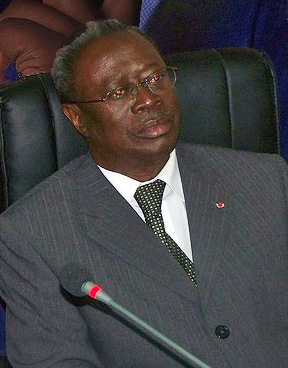
Robert Sagna is a Senegalese politician who served in the government of Senegal from 1978 to 2000 and was Mayor of Ziguinchor from 1984 to 2009. He was elected to the National Assembly of Senegal in 2007.
Djibo Leyti Kâ was a Senegalese politician and the Secretary-General of the Union for Democratic Renewal (URD). He was a prominent minister under President Abdou Diouf from 1981 to 1995 and founded the URD in 1998 after splitting from Diouf's Socialist Party (PS). From 2004 to 2012, he again served in the government under President Abdoulaye Wade, initially as Minister of State for Maritime Economy and then as Minister of State for the Environment beginning in 2007. Man of the state, he then was appointed Minister under Macky Sall's government before becoming the Director of the CNDT.

Parliamentary elections were held in Senegal on 29 April 2001 to elect members of the National Assembly. They were the first held under the new constitution approved by a referendum earlier in the year. Following the victory of Abdoulaye Wade in the February–March 2000 presidential election, the Sopi Coalition, including Wade's Senegalese Democratic Party and its allies, won a large majority.

General elections were held in Senegal on 26 February 1978 to elect a President and National Assembly. Following a constitutional amendment in 1976, the elections were open to more than one party for the first time since 1963. President Léopold Sédar Senghor of the Socialist Party was challenged by Abdoulaye Wade of the Senegalese Democratic Party, but won with 82% of the vote. Members of the National Assembly were elected by closed-list proportional representation. In the National Assembly election, the Socialist Party won 82 of the 100 seats. Voter turnout was 63% in the presidential election and 63% in the parliamentary election.

Presidential elections were held in Senegal on 26 February 2012, amidst controversy over the constitutional validity of a third term for incumbent president Abdoulaye Wade. In the runoff on 25 March, Macky Sall defeated the incumbent president. The 2015 documentary film Incorruptible chronicles both campaigns as well as the youth movement Y'en a Marre, which led protests against Wade's administration.


